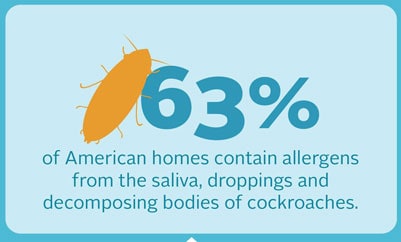Click To Call > (800) 966-7673
Wednesday, January 7, 2015
Have you seen them running around the kitchen? Have you watched one crawl out of your air conditioner upside down, and then scurry up the wall? There aren't many who would say that having roaches is wonderful, but surprisingly few people appropriately deal with this insect. Laying down a few roach motels or spraying the cracks of your kitchen with pesticide is not only ineffective, it puts your family at risk. The CDC recommends Integrated Pest Management (IPM) to reduce these risks.
The World Health Organization
According to WHO, cockroaches can spread organisms that lead to the following: diarrhoea, dysentery, cholera, leprosy, plague, typhoid fever, and viral diseases. In addition, they carry the eggs of parasitic worms and may cause allergic reactions, including dermatitis, itching, swelling of the eyelids, and more serious respiratory conditions. They also say, "cockroaches move freely from building to building or from drains, gardens, sewers, and latrines to human habitations. Because they feed on human feces and human food they can spread germs that cause disease." Does any of this sound like something you want in your home?
The Centers for Disease Control and Prevention
Though the CDC is quick to say that little evidence exists to link cockroaches to specific disease outbreaks, research in their labs has shown them to carry Salmonella typhimurium, Entamoeba histolytica, and the poliomyelitis virus. In another article by the CDC they say, "Cockroaches are capable of harboring Escherichia coli, Enterobacter spp., Klebsiella spp., Pseudomonas aeruginosa, Acinetobacter baumannii, other nonfermentative bacteria, Serratia marcescens, Shigella spp., Staphylococcus aureus, group A streptococci, Enterococcus spp., Bacillus spp., various fungi, and parasites and their cysts."

The Asthma and Allergy Foundation of America
Both the CDC and AAFA directly connect cockroaches to asthma. AAFA says, "In the 1970s, studies made it clear that patients with cockroach allergies develop acute asthma attacks. The attacks occur after inhaling cockroach allergens and last for hours." These allergens can go airborne if cockroaches leave their feces, or discarded skins in air ducts.
What is the solution?
The CDC says, "Integrated pest management (IPM) techniques are necessary to reduce the number of pests that threaten human health and property." If you have cockroaches in your Ohio home, contact a pest management company that practices Integrated Pest Management practices. You don't have to have roaches in your house. Ever. Get protected today.
World Health: http://www.who.int/water_sanitation_health/resources/vector288to301.pdf
CDC: http://www.cdc.gov/asthma/triggers.html
http://wwwnc.cdc.gov/eid/article/15/3/07-1484_article
http://www.cdc.gov/nceh/publications/books/housing/cha04.htm
Asthma and Allergy Foundation of America
http://www.aafa.org/display.cfm?id=9&sub=22&cont=312